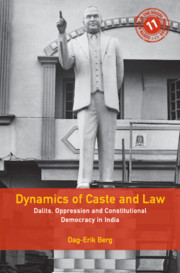Book contents
- Frontmatter
- Contents
- List of Abbreviations
- Preface
- Acknowledgements
- Introduction
- 1 Foundations of Caste and Constitutional Democracy: Ambedkar, Equality and Law
- 2 Law beyond Untouchability: From Temple Entry to Atrocity and Legal Change
- 3 The Karamchedu Killings and the Struggle to Uncover Untouchability
- 4 Casteism and the Tsundur Atrocity
- 5 Goals of Law, Goals of Order: Institutional Conversion after Atrocities
- 6 Modernity of Caste: Higher Education, Inequality and Caste Struggles for Reservation
- 7 Conclusions on Caste and Law
- Glossary
- Bibliography
- Index
6 - Modernity of Caste: Higher Education, Inequality and Caste Struggles for Reservation
Published online by Cambridge University Press: 24 December 2019
- Frontmatter
- Contents
- List of Abbreviations
- Preface
- Acknowledgements
- Introduction
- 1 Foundations of Caste and Constitutional Democracy: Ambedkar, Equality and Law
- 2 Law beyond Untouchability: From Temple Entry to Atrocity and Legal Change
- 3 The Karamchedu Killings and the Struggle to Uncover Untouchability
- 4 Casteism and the Tsundur Atrocity
- 5 Goals of Law, Goals of Order: Institutional Conversion after Atrocities
- 6 Modernity of Caste: Higher Education, Inequality and Caste Struggles for Reservation
- 7 Conclusions on Caste and Law
- Glossary
- Bibliography
- Index
Summary
As an integral part of India's modernity, caste is not simply a phenomenon in rural areas or in extreme cases of caste-related violence. It is part of everyday life in modern institutions, where it represents a contingent element in social relations. Caste is, overall, subject to several types of conflicts, ranging from public debates and democratic interaction to humiliation and outright exclusion. In practice, caste is manifested in different ways; it is often identified in terms of politics of inequality, which involves large clusters of castes as well as caste-based discrimination. On the one hand, inequality and struggles for material resources animate caste-based mobilization that presses for new entitlements to reserved quotas. This mobilization comprises radically different groups, from the powerful landowning Jats in north India to the destitute Madigas in Telugu-speaking regions in south India. On the other hand, there is even caste-based discrimination in higher education institutions, which has become more visible in recent years.
According to modernization theory, religion will lose its relevance and tradition will be replaced with a new set of values which are specifically modern. The American political scientists Lloyd and Susanne Rudolph argued in the 1960s that this opposition between modernity and tradition, which was prominent in the European Enlightenment and in Marx's writings, was inadequate. Although they thought that the opposition was heuristically useful, their idea was that modernity and tradition infiltrated each other and that caste was used as an instrument for political mobilization. Their seminal argument is modest and outdated today, and their approach does not quite explain the force with which caste has played out in modern institutions such as higher education institutions.
The controversies regarding caste in higher education and public employment are important when examining why caste seems to be reproduced and even to gain a new intensity in contemporary India. The mechanism of oppression in the Dalit situation is not confined to rural areas. Context matters. But the ontological drive of caste appears to be an integral part of modernity that plays out in different ways, as case studies on the higher education sector suggest.
The politics of reservation policies involves groups and goes beyond electoral politics, but reservation policies also affect elections. The two most central controversies regarding caste-based reservation in India were related to the implementation of the Mandal Commission Report.
- Type
- Chapter
- Information
- Dynamics of Caste and LawDalits, Oppression and Constitutional Democracy in India, pp. 170 - 196Publisher: Cambridge University PressPrint publication year: 2020



